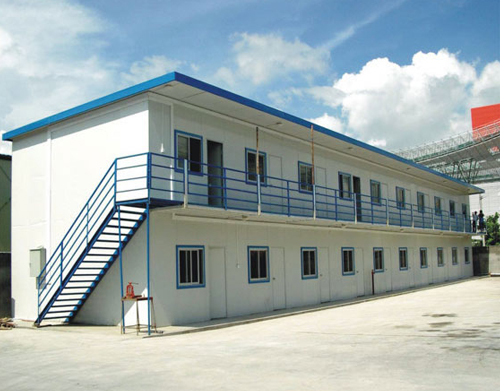近年來,鋼結構板房因其建造周期短、成本可控、可移動性強等特點,在禹城及周邊地區的臨時建筑、工地辦公、應急安置等領域廣泛應用。然而,隨著公眾意識的提升,關于鋼結構板房是否含有甲醛的疑問逐漸增多。本文將從材料構成、工藝特性、環境影響等維度,系統解析鋼結構板房的甲醛問題。
In recent years, steel structure panel houses have been widely used in temporary buildings, construction site offices, emergency resettlement, and other fields in Yucheng and surrounding areas due to their short construction period, controllable cost, and strong mobility. However, with the increasing public awareness of environmental protection, questions about whether steel structure panel houses contain formaldehyde are gradually growing. This article will systematically analyze the formaldehyde problem in steel structure panel houses from dimensions such as material composition, process characteristics, and environmental impact.
一、鋼結構板房的材料構成與甲醛來源
1、 Material composition and formaldehyde sources of steel structure panel houses
鋼結構板房的主體結構由鋼柱、鋼梁、檁條等構件組成,這些金屬材料本身不含甲醛。甲醛釋放主要來源于以下兩類材料:
The main structure of the steel structure panel house is composed of steel columns, steel beams, purlins and other components, and these metal materials themselves do not contain formaldehyde. Formaldehyde emissions mainly come from the following two types of materials:
圍護板材
Enclosure board
彩鋼夾芯板:作為常見的墻體和屋面材料,其芯材可能涉及甲醛問題。聚苯乙烯(EPS)夾芯板在生產過程中若使用脲醛樹脂作為膠黏劑,可能殘留微量甲醛。
Color steel sandwich panel: As the most common wall and roof material, its core material may involve formaldehyde issues. If urea formaldehyde resin is used as an adhesive in the production process of polystyrene (EPS) sandwich panels, trace amounts of formaldehyde may remain.
巖棉/玻璃棉板:以玄武巖或玻璃纖維為原料,經高溫熔融制成,屬于無機材料,甲醛釋放風險極低。
Rock wool/glass wool board: made from basalt or glass fiber as raw materials, melted at high temperature, belonging to inorganic materials, with extremely low risk of formaldehyde release.
金屬雕花板:表面采用金屬壓花工藝,內層為阻燃聚氨酯或聚苯乙烯,需關注發泡劑的性能。
Metal carved board: The surface adopts metal embossing technology, and the inner layer is made of flame-retardant polyurethane or polystyrene. Attention should be paid to the environmental performance of the foaming agent.
室內裝飾材料
Indoor decorative materials
地板:PVC地板、復合地板在生產中可能添加含甲醛的膠黏劑,需選擇符合GB 18580《室內裝飾裝修材料 人造板及其制品中甲醛釋放限量》標準的產品。
Flooring: PVC flooring and composite flooring may contain adhesives containing formaldehyde during production, and products that comply with the GB 18580 standard for formaldehyde emission limits in indoor decorative materials, artificial boards, and their products should be selected.
隔斷材料:石膏板、硅酸鈣板等輕質隔墻若使用劣質膠黏劑,可能成為甲醛釋放源。
Partition materials: Lightweight partition walls such as gypsum board and calcium silicate board may become a source of formaldehyde release if inferior adhesives are used.
密封膠與涂料:門窗密封膠、內墻涂料若含揮發性有機化合物(VOCs),可能伴隨甲醛釋放。
Sealing glue and coating: If door and window sealing glue and interior wall coating contain volatile organic compounds (VOCs), they may be accompanied by formaldehyde release.
二、甲醛釋放的關鍵影響因素
2、 Key influencing factors of formaldehyde release
材料質量等級
Material quality grade
型板材:選擇E0級(甲醛釋放量≤0.5mg/L)或ENF級(≤0.025mg/m3)人造板,可顯著降低甲醛風險。
Environmentally friendly board: Choosing E0 grade (formaldehyde emission ≤ 0.5mg/L) or ENF grade (≤ 0.025mg/m3) artificial board can significantly reduce the risk of formaldehyde.
低成本替代品:部分低價夾芯板可能采用脲醛樹脂膠,需謹慎選擇。
Low cost alternatives: Some low-priced sandwich panels may use urea formaldehyde resin adhesive, so careful selection is necessary.

施工工藝
Construction technology
現場切割:板材切割過程中可能破壞表面封邊,加速甲醛釋放。建議采用工廠預制、現場組裝工藝。
On site cutting: During the cutting process of the board, the surface edge may be damaged, accelerating the release of formaldehyde. Suggest using factory prefabrication and on-site assembly processes.
密封處理:板縫、接縫處若未做密封處理,可能形成甲醛擴散通道。
Sealing treatment: If the board joints and seams are not sealed, formaldehyde diffusion channels may form.
使用環境
Usage environment
溫度與濕度:甲醛釋放量隨溫度升高而增加,濕度大于60%時釋放速度加快。禹城夏季高溫環境可能加劇短期釋放。
Temperature and humidity: The release of formaldehyde increases with temperature, and the release rate accelerates when the humidity exceeds 60%. The high temperature environment in Yucheng during summer may exacerbate short-term releases.
通風條件:密閉空間內甲醛濃度易累積,需通過機械通風或自然通風稀釋。
Ventilation conditions: Formaldehyde concentration is prone to accumulate in enclosed spaces and needs to be diluted through mechanical ventilation or natural ventilation.
三、甲醛檢測與控制建議
3、 Suggestions for formaldehyde detection and control
檢測方法
Testing method
現場檢測:采用便攜式甲醛檢測儀,監測板材接縫、家具密集區域,檢測前需密閉空間12小時。
On site testing: A portable formaldehyde detector is used to monitor the joints of the board and areas with dense furniture. A sealed space must be used for 12 hours before testing.
實驗室檢測:委托CMA認證機構,依據GB/T 18883《室內空氣質量標準》進行采樣分析。
Laboratory testing: Commissioned CMA certification agency to conduct sampling and analysis in accordance with GB/T 18883 "Indoor Air Quality Standards".
控制措施
Control measures
源頭控制:優先選用巖棉/玻璃棉夾芯板,要求供應商提供甲醛檢測報告;室內裝飾材料選擇水性涂料、無醛膠黏劑。
Source control: prioritize the use of rock wool/glass wool sandwich panels, and require suppliers to provide formaldehyde testing reports; Choose water-based coatings and formaldehyde free adhesives as indoor decoration materials.
過程管理:施工階段避免破壞板材保護層,板縫處使用密封膠,完工后進行清潔與通風。
Process management: During the construction phase, avoid damaging the protective layer of the board, use environmentally friendly sealant at the board joints, and conduct comprehensive cleaning and ventilation after completion.
后期治理:通過放置活性炭、安裝空氣凈化器、種植綠蘿等植物輔助凈化空氣。
Post treatment: By placing activated carbon, installing air purifiers, and planting plants such as green ivy to assist in purifying the air.
四、科學認知與主動防控
4、 Scientific cognition and proactive prevention and control
鋼結構板房的甲醛問題并非必然存在,其風險取決于材料選擇、施工工藝與使用管理。通過以下方式可有效控制風險:
The formaldehyde problem in steel structure panel houses is not necessarily present, and its risk depends on material selection, construction technology, and usage management. The following methods can effectively control risks:
合同約束:在租賃或采購合同中明確條款,要求提供甲醛檢測合格證明。
Contractual constraints: Clearly state environmental protection clauses in leasing or procurement contracts and require the provision of formaldehyde testing certificates.
驗收把關:完工后委托第三方檢測,確保空氣質量達標后再投入使用。
Acceptance check: After completion, entrust a third party to conduct testing to ensure that the air quality meets the standards before putting it into use.
長期監測:對于長期使用的板房,建議每季度進行一次空氣質量檢測。
Long term monitoring: For long-term use of prefabricated houses, it is recommended to conduct air quality testing once every quarter.
鋼結構板房的甲醛問題需以科學態度對待,既不必過度恐慌,也不可忽視潛在風險。通過選擇材料、優化施工流程、加強后期管理,可實現使用與要求的平衡。隨著綠色建材技術的進步,低甲醛、無甲醛的鋼結構板房產品正在逐步普及,這將為禹城地區的臨時建筑提供更健康的解決方案。
The formaldehyde problem in steel structure panel houses should be treated with a scientific attitude, without excessive panic or ignoring potential risks. By selecting environmentally friendly materials, optimizing construction processes, and strengthening post management, a balance between safe use and environmental requirements can be achieved. With the advancement of green building materials technology, low formaldehyde and formaldehyde free steel structure panel house products are gradually becoming popular, which will provide a healthier solution for temporary buildings in Yucheng area.
本文由禹城鋼結構板房友情奉獻.更多有關的知識請點擊:http://www.yunhu3.com真誠的態度.為您提供為的服務.更多有關的知識我們將會陸續向大家奉獻.敬請期待.
This article is a friendly contribution from Yucheng Steel Structure Plate House For more information, please click: http://www.yunhu3.com Sincere attitude To provide you with comprehensive services We will gradually contribute more relevant knowledge to everyone Coming soon.